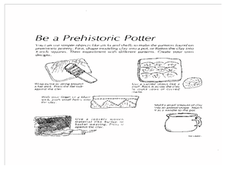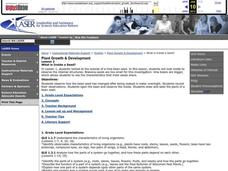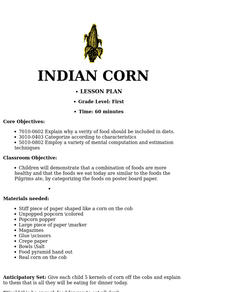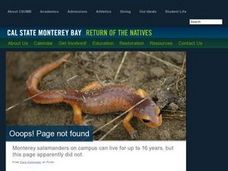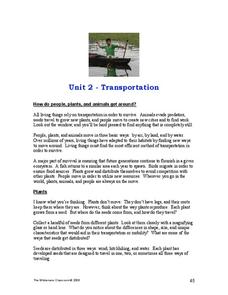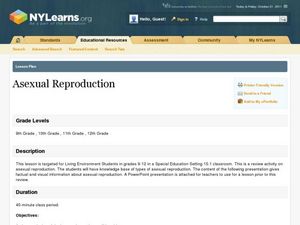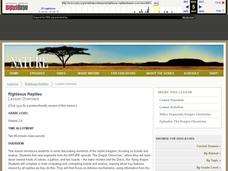Curated OER
Trees of our Forests
Young scholars use a field guide in order to identify trees. In this trees lesson plan, learners classify the trees that they identify based on their relationships. Young scholars take a trip outdoors to look at trees.
Curated OER
What's Up at the Rim?
Pupils are sent on a scavenger hunt to find as many plants as they can in nature.
Curated OER
Sock Walk
First graders, after brainstorming all the ways seeds are scattered and viewing a multitude of examples of seeds, explore how seeds travel by taking a walk outdoors wearing socks over their shoes. In addition, they assess how seeds...
Curated OER
The Global Impact of Insect Borne Diseases & Agriculture
Students study the global impact of insect borne diseases, the appropriate use of pesticides, and the concept of human interrelations on a world wide scale. They examine how to safely apply a pesticide, according to the label.
Curated OER
Monocots vs. Dicots
Students examine the differences in nonvascular and vascular plants. They compare the differences between gymnosperm and angiosperms. Students compare the differences between moocots and dicots. They view a powerpoint presentation on...
Curated OER
Archaeology and Prehistoric Native Americans
Students study the terms paleontology and archaeology and examine how they can help us learn about prehistoric Native Iowans. In this archaeology lesson students discuss these terms and view a video on Native Americans.
Curated OER
Everything in Its Place: Science Classification
Students investigate the system of classification for living things through the sixteen lessons of this unit. The five kingdoms of monerans, protists, fungi, plants, and animals form the basis of several experiments as the similarities...
Curated OER
Living and Non-Living
Fourth graders are divided into small groups and collect 4 objects from the playground. They take 5 to 10 minutes to classify their groups and discuss their findings including the terms "living" and "non-living". As a class they discuss...
Curated OER
What is Inside a Seed?
Middle schoolers observe how the bean seed has changed after being soaked in water overnight and record their observations. They open the bean and observe the inside. Finally, students draw and label the parts of a bean seed and write...
Curated OER
Flowers Growing Through Music, Rhymes & Movement
First graders experience the growing process of a seed becoming a flower as it is exposed to the sun, rain, wind, day and night, and -tickling- bees as they move creatively to music.
Curated OER
Indian Corn
First graders demonstrate that eating combinations of food is very healthy. They discover that foods we eat today are similar to the foods the Pilgrims ate by categorizing the foods on poster board paper.
Curated OER
Invasive Species
Learners study exotic and native species, and examine how exotic species can impact native ones. They study how the mute swan effects native species.
Curated OER
Winter
Pupils examine how animals adapt to the harsh New England winter. They discuss articles they have read on the subject.
Curated OER
Life Cycles
Using computers, Students work in small groups and progress through the roles of Explorer, Researcher, Designer, and Evaluator as they study the life cycle of plants, insects, butterflies and frogs.
Curated OER
the Naturalist's Notebook
Third graders, after brainstorming what they already know about trees and what effect the seasons have on them, create a model of a hollow log. They participate in a young naturalist's notebook writing activity while walking outside...
Curated OER
Population Explosion Relay
Learners study the concepts of seed dispersal, germination rate, exponential population growth, and predation by engaging in a bean 'weeds vs. natives' relay race. They illustrate how weeds out-compete other plants for space by crowding...
Curated OER
Algae--Where does it Live?
Students discover algae. In this science lesson plan, students examine what green algae is and where it grows. Students test the growth of algae in four different types of water: lake water, well water, distilled water and tap water
Curated OER
Transportation
Students read about various modes of transportation for people, plants, and animals. In this transportation lesson, students read information about the transportation modes for people plants, and animals using water and land. Students...
Curated OER
Life Science Review for Grade 4
In this life science review for grade 4 worksheet, 4th graders answer 25 multiple choice questions in standardized test format about life science.
Curated OER
Examining Seeds
Students explore botany by conducting an investigation in class. In this seeds lesson, students utilize lima bean seeds and magnifying glasses to examine the different parts of a seed after it has been dissected. Students compare...
Curated OER
Natural Figures
First graders look for geometrical shapes in nature to help them appreciate the diversity of the natural environment.
Curated OER
Asexual Reproduction
Sixth graders investigate how asexual reproduction produces single-parent offspring. They use plants and yeast to demonstrate vegetative propagation and budding in a laboratory. Students draw five different types of asexual reproduction.
PBS
Righteous Reptiles
Young scientists write and draw about their knowledge of reptiles. They also view a nature video focusing on lizards and snakes, complete a chart comparing and contrasting them. Next, they focus on the defense mechanisms that they...
Curated OER
Comparing and Contrasting
Students practice compare and contrast skills. In this science and language development lesson, students complete a T chart generating traits of a snail and a clam. Students complete a related worksheet.
Other popular searches
- Edible Plant Characteristics
- Animal Plant Characteristics
- 3 Plant Characteristics
- Land Plant Characteristics
- Characteristics of Plant Cells







